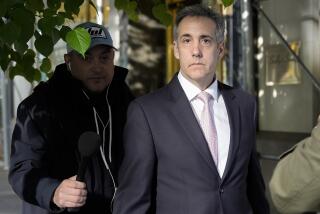Inquiry Spurs Host of Legal Questions
WASHINGTON — The ever-expanding battle between independent counsel Kenneth W. Starr and the White House has given rise to several legal questions. Among the major ones:
Q. Legally, what is the connection between Monica S. Lewinsky and Starr’s investigation?
A. Lawyers for Paula Corbin Jones, who has accused President Clinton of making a crude sexual proposition to her when he was governor of Arkansas, have sought to take sworn statements from other women to determine if Clinton has had sexual affairs with them. The lawyers sought testimony from Lewinsky, who submitted an affidavit denying that she had had an affair with the president. Clinton gave a deposition, an interview under oath, in which he also denied an affair.
Starr suspects those denials are false. He is investigating whether Clinton or his friend Vernon E. Jordan Jr. provided incentives to Lewinsky, such as getting job offers for her, in order to get her to deny an affair. Starr already had been investigating whether Jordan was involved in obtaining similar incentives for Webster L. Hubbell, the former associate attorney general, in order to persuade him not to testify fully about the Whitewater case. The prosecutors also are looking at whether Lewinsky or others tried to persuade her friend Linda Tripp to conceal what Lewinsky had told her about an alleged relationship with Clinton.
Q. Tripp taped telephone calls with Lewinsky without Lewinsky’s knowledge. Is that legal?
A. The answer varies from state to state. California forbids taping a telephone conversation without informing the other party. So does Maryland, where Tripp lives. But Maryland courts have ruled that a person can be charged only if prosecutors can show that she knew that what she was doing violated the law.
Local prosecutors have said they will take no action on the matter until Starr’s investigation is finished.
Q. What would Starr have to prove in order to bring charges against Clinton, Lewinsky or Jordan?
A. To prove perjury, prosecutors would have to show that the statements Clinton or Lewinsky made were false and also were “material” to the investigation that Jones’ lawyers are conducting.
To prove obstruction of justice, prosecutors would have to show that Clinton, Jordan or others took steps to induce Lewinsky or Tripp to give false testimony on a material matter.
Q. What does “material” mean?
A. A statement is considered material if it has the “tendency” to “influence, impede or hamper” an investigation.
Q. Now that Judge Susan Webber Wright, who is presiding over the Jones case, has ruled that testimony about Lewinsky cannot be used in the trial, are the statements by Clinton and Lewinsky no longer material?
A. Legal experts disagree.
In past cases involving false statements to grand juries, testimony has been considered material even though a judge ruled the evidence could not be used at a trial. Whether the same rule would apply in this case is unclear, in part because the depositions were taken in a civil case, not before a grand jury.
In addition, Wright’s ruling did not say that evidence about Lewinsky was irrelevant to Jones’ case. Instead, she said the evidence might or might not be relevant but that it was not essential to Jones’ case and that gathering it would delay the trial unduly and would interfere with Starr’s investigation. That ruling leaves the issues of “materiality” in doubt.
Finally, because the Jones case involves charges of sexual harassment, while the Lewinsky matter involves allegations of a consensual affair, some lawyers question whether statements about Clinton’s relationship with Lewinsky are “material” in the first place.
Clinton’s own lawyers reportedly doubt that they could have charges thrown out on the grounds that the statements involved are not material. But they might give the argument a try if Starr does seek an indictment.
Q. Can Jones’ lawyers appeal the ruling that excluded testimony about Lewinsky?
A. Probably not. Except in rare cases, federal courts do not allow appeals of rulings about evidence until after the trial is over.
Q. If Starr could prove his case, could he actually indict the president?
A. Whether a sitting president can be indicted is another often-discussed, but unresolved, issue.
The Justice Department issued an opinion in 1973 that a prosecutor would have to refer any potential charges to the House of Representatives, which could consider them as grounds for impeachment. Other scholars believe a prosecutor could proceed with an indictment.
More to Read
Sign up for Essential California
The most important California stories and recommendations in your inbox every morning.
You may occasionally receive promotional content from the Los Angeles Times.











